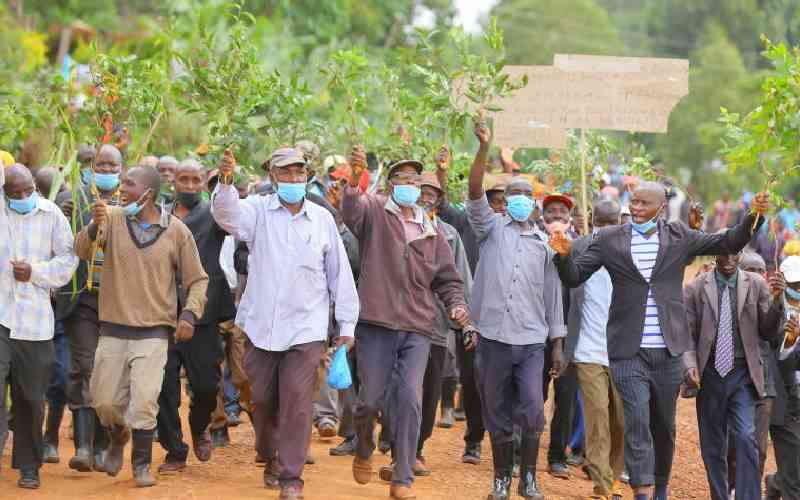Distressed borrowers are emerging as the unlikely beneficiaries of the Covid-19 pandemic as lenders have been restricted from disposing of their property.
Since March when the virus was reported in Kenya, there have been no foreclosures while all the properties lined up for sale had been distressed way before the pandemic.
Among the reasons that have provided the rare relief is the ban on gatherings, which would include the bidding process, while the law requires that sale by auction be accessible to anyone.
In effect, the auctioneers cannot conduct physical auctions for the distressed properties which could contravene the health protocols on social distancing.
Further, the restrictions on movement into select counties including Nairobi and Mombasa only means that potential bidders from outside the city would be technically barred.
What all this means is that lenders are stuck with defaulting real estate properties as auctioneers are unable to attract takers.
Joseph Gikonyo, the managing director of auction firm Garam Investments, says the movement restrictions imposed on select counties means there would inadvertently mean fewer bidders, forcing them to move online.
However, the law requires auctioneers to only dispose of property in a public auction - not online bidding - which has forced banks to renegotiate payment terms on bad loans rather than put them on auction.
“We have been advised that all auctions have been suspended so even when you see the many properties being listed now, they are from before Covid-19,” Mr Gikonyo told Home & Away.
A requirement in the governing law for auctioneers drafted over two decades ago had not contemplated the impact of the internet on today’s business.
Many of the current auctions have resulted from voluntary asset disposals, which are limited in finding the highest bidder for any of the properties on sale.
“Properties that we are disposing now are from voluntary sales seeking a transparent means to dispose and not from distressed borrowers,” Gikonyo said, attributing the huge number of auction notices to a mounting backlog.
Non-governmental and State institutions often seek to offload idle assets through auctions, which is providing business for auctioneers in these tough times.
All the auction sales arising from civil defaults that are active have been traced to before March, while the lack of takers over time has resulted in huge accumulation of unsold properties.
Auctioneers such as Gikonyo are required under the law to state the date, time and venue of the auction after the courts have given direction for repossession.
Stay informed. Subscribe to our newsletter
At the venue, the auctioneer is required to facilitate anyone intending to attend and observe, regardless of whether they would be bidding or not.
But with the health guidelines on social distancing that would mean crowding is avoided, then accommodating crowds in the bidding process would be impossible.
A concern about the soaring numbers of published auction notices in the middle of the unfolding Covid-19 pandemic is raising fears that lenders are insensitive to borrowers’ interests.
Banks have indicated that loans with a collective value of Sh360 billion have been restructured as part of the contribution by lenders to support the economy to navigate the ravages of the coronavirus.
What that meant is that the distressed borrowers have managed to negotiate with their lenders to effectively put off any property repossessions.
Peter Gachie of Regent Auctioneers says the holiday enjoyed by the defaulting borrowers would only last as long as the judicial system remains closed, with the likelihood of a surge once the economy finally opens up.
It might take until the end of 2020 for the repossessions to surge as the loan repayments for secured debts has been significantly strained, he added.
“Once the economy opens after Covid-19, there will be a spike in the number of repossessions since the loans are not being serviced while the courts would be open to make determinations to attach properties,” Gachie said.
The real estate market was in trouble even before the outbreak of coronavirus and had accounted for a huge portion of non-performing loans, spiking auction advertisements as banks attempted to recoup some of their money.
This added to an oversupply of housing and office units against depressed demand following three years of interest rates cap that had starved the economy of cash, and non-payment of government suppliers that stifled cash flows.
The problem had been aggravated by the property boom that had seen speculation drive prices of property through the roof.
Trying to sell them in the auction market required massive discount, yet the law only allows auctioneers to sell at not less than 75 per cent the value of the property.
Section 97 of the Land Act, 2012 requires banks to exercise duty of care on repossessed properties and empowers defaulters to sue if their assets are sold off cheaply.
As customers continued to default, banks became real estate owners without a market, forced to advertise and re-advertise auctions for property that is not getting sold.
Following the outbreak of the pandemic, bankers have now been forced to go easy on defaulters as part of the coronavirus stimulus package introduced in March when the virus broke out.
Commercial banks have been barred from initiating auctions on distressed property as a result of Covid-19, suggesting that all the numerous auctioneers’ notices are prior to the pandemic and the properties are just not finding takers.
According to Central Bank of Kenya data shared during a webinar with Kenya Private Sector Alliance, 32 out of 39 banks have restructured loans for 10 sectors of the economy, with trade leading at 26.3 per cent followed by real estate accounting for 18.6 per cent.
Tourism and hotels account for 13.6 per cent and manufacturing makes up 13.6 per cent.
The real estate market is more or less dead as banks are now refusing to finance new developments and real estate developers abandon plans for new projects to focus on selling off existing property.
Housing Finance Group, for example, reduced prices on 700 houses by 30 per cent and this year decided it would exit the home construction business once it completes the units it is currently building.
Shelter Afrique, another mortgage lender, froze loans for two-and-a-half years and announced restructuring and reforms of its financing model.
 The Standard Group Plc is a
multi-media organization with investments in media platforms spanning newspaper
print operations, television, radio broadcasting, digital and online services. The
Standard Group is recognized as a leading multi-media house in Kenya with a key
influence in matters of national and international interest.
The Standard Group Plc is a
multi-media organization with investments in media platforms spanning newspaper
print operations, television, radio broadcasting, digital and online services. The
Standard Group is recognized as a leading multi-media house in Kenya with a key
influence in matters of national and international interest.
 The Standard Group Plc is a
multi-media organization with investments in media platforms spanning newspaper
print operations, television, radio broadcasting, digital and online services. The
Standard Group is recognized as a leading multi-media house in Kenya with a key
influence in matters of national and international interest.
The Standard Group Plc is a
multi-media organization with investments in media platforms spanning newspaper
print operations, television, radio broadcasting, digital and online services. The
Standard Group is recognized as a leading multi-media house in Kenya with a key
influence in matters of national and international interest.








